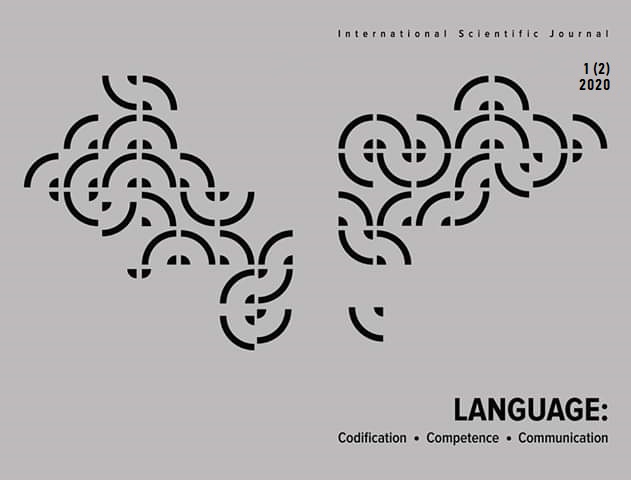CHARACTERISTICS OF THE PROCESS OF PROFESSIONAL TRAINING FOR COMMUNICATIVE INTERACTION OF TECHNICAL PROFESSIONALS (ON THE EXAMPLE OF SPECIALISTS IN THE FIELD OF MARITIME TRANSPORT)
DOI:
https://doi.org/10.24025/2707-0573.1(2).2020.202545Abstract
Background
The requirements of the international organizations (IMO - International Maritime Organization, ICAO - International Civil Aviation Organization) are aimed at improving the safety of air and sea transport, which necessitates proper foreign language training of maritime and air transport specialists.
Purpose: to analyze the current state of preparation of future seafarers for professional communicative interaction at the theoretical and practical levels.
Methods
Critical analysis of scientific publications indicates the existence of research: 1) on various aspects of foreign language training of future technical specialists (Patijevych, 2016; Kolodii, 2012; Radvansky, 2012, etc.); 2) specific features of teaching different types of speech skills of future specialists in technical specialties (Mykytenko, 2011; Tarasiuk, 2018, etc.); 3) features of foreign language training of future specialists of the navy (Kulakova, 2006; Kozak, 2001). The analysis shows the absence of a comprehensive study of the fundamentals of professional communicative interaction of future seafarers.
While studying the practical aspects of training maritime transport professionals for professional communication, educational resources have been analyzed (Bohomolov, Kyrychenko, 2004; Blakey, 1983; Murrell, Nagliati, Canestri, 2009; Taylor, Goodwell, 2012; Sheppard, Evans, Dooley, 2013) according to the following criteria: 1) compliance with the objectives of teaching and the requirements of the methodology of teaching foreign languages; 2) taking into account the level of communicative training of students, their interests and needs as future professionals; 3) complexity in teaching professionally oriented foreign language communication; 4) the communicative nature of the tasks; 5) the authenticity of the text material. The analysis showed the lack of attention to integrated learning of different types of speech skills, the psycholinguistic aspects of communicative interaction of seafarers.
Results
The paper identifies the main shortcomings of the modern process of foreign language training of future seafarers and proves the need to develop a comprehensive pedagogical system of training these specialists for professional communication.
Discussion
Despite a number of indisputable positives, the available theoretical developments, textbooks and manuals, which are used today by teachers and students of maritime universities, do not fully meet modern requirements. Therefore, there is a need to create a model of preparation for professional interaction, taking into account the integration of the current methodological ideas and specifics of professional communication activities of future seafarers, which raises the need for theoretical substantiation of methods of integrated training of professionally oriented foreign language communication of seafarers with professionally oriented disciplines. It is in this aspect that we see the prospect of further scientific research.
Keywords: communicative interaction, foreign language communicative competence, future seafarers, English for specific purposes, professional communicative activity
References
Богомолов, О. С., Кириченко, М. Ю. (2004). An Introductory Course of Marine Engineering Students, Одесса: ОМА. Золотовська, В. С. (2019). Тенденції вивчення іноземних мов у вищих навчальних закладах морського профілю (70-і роки ХХ – початок ХХІ століття), Автореф. дис. канд. пед. наук, Херсон. Козак, С. В. (2001). Формування іншомовної комунікативної компетенції майбутніх фахівців морського флоту: Автореф. дис. канд. пед. наук, Одеса. Колодій, І. А. (2012). Формування професійної компетентності у майбутніх перекладачів авіаційної галузі на основі інтеграції загальноосвітніх і професійно-орієнтованих дисциплін: Автореф. дис. канд. пед. наук, Київ. Кулакова, М. В. (2006). Формування готовності до професійної діяльності в майбутніх фахівців у вищих морських навчальних закладах: Автореф. дис. канд. пед. наук, Одеса. Микитенко, Н. О. (2011). Теорія і технології формування іншомовної професійної компетентності майбутніх фахівців природничих спеціальностей: Автореф. дис. докт. пед. наук, Тернопіль. Огородник, Н. Є. (2017). Модернізація змісту навчання англійської мови майбутніх моряків, Вісник КНЛУ. Серія Педагогіка та психологія, Випуск 26: 63-72. Патієвич, О. В. (2016). Методика навчання стилістичної унормованості наукового писемного англійського мовлення майбутніх фізиків в умовах магістратури: Автореф. дис. канд. пед. наук, Київ. Радванський, А. І. (2012). Формування соціокультурної компетентності майбутніх офіцерів правоохоронних органів: Автореф. дис. канд. пед. наук, Хмельницький. Тарасюк, Н. М. (2018). Формування у майбутніх інженерів-будівельників англомовної лексико-граматичної компетентності у читанні: Автореф. дис. канд. пед. наук, Київ. Blakey ,T. N. (1983). English for maritime studies, Prentice Hall International. International STCW Convention (1978). Електронний ресурс. Режим доступу (30.04.2020): http://www.imo.org/en/OurWork/HumanElement/TrainingCertification/Pages/STCW-Convention.aspx Morska, L. (2017). ESP (English for Specific Purposes): implications for teaching, Konteksty pedagogiczne, 2(9): 165-175. Murrell, S., Nagliati, P., Canestri, S. (2009). Safe Sailing: SMCP Training for Seafarers, Cambridge: Cambridge University Press. Sheppard, S. T., Evans, V., Dooley, J. (2013). Career Paths: Merchant Navy, Express Publishing. Taylor, J., Goodwell, J. (2012). Career Paths: Navy. Express Publishing. Tenopir, C., King, D. W. (2004). Communication Patterns of Engineers. New Jersey: Wiley; IEEE Press.
Published
Issue
Section
License
Copyright (c) 2020 Liliya I Morska

This work is licensed under a Creative Commons Attribution-NonCommercial 4.0 International License.
Authors hold full copyright and at the same time they transfer the publishing rights to the journal. The author of a published article has the right to distribute it, post the work in the electronic repository of his/her institution, publish as a part of a monograph, etc. with a required link to the place (output) of its first publication.
The authors confirm that the scientific article submitted for publication has not previously been published and has not been submitted to the editorial office of other journals.
If you have any questions, please contact us:
email: ukrmova@chdtu.edu.ua, o.pchelintseva@chdtu.edu.ua
Viber / WhatsApp: +38 093 789 09 27


